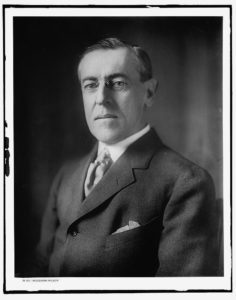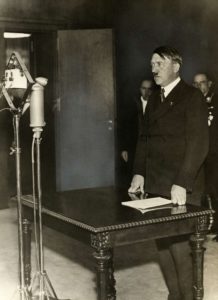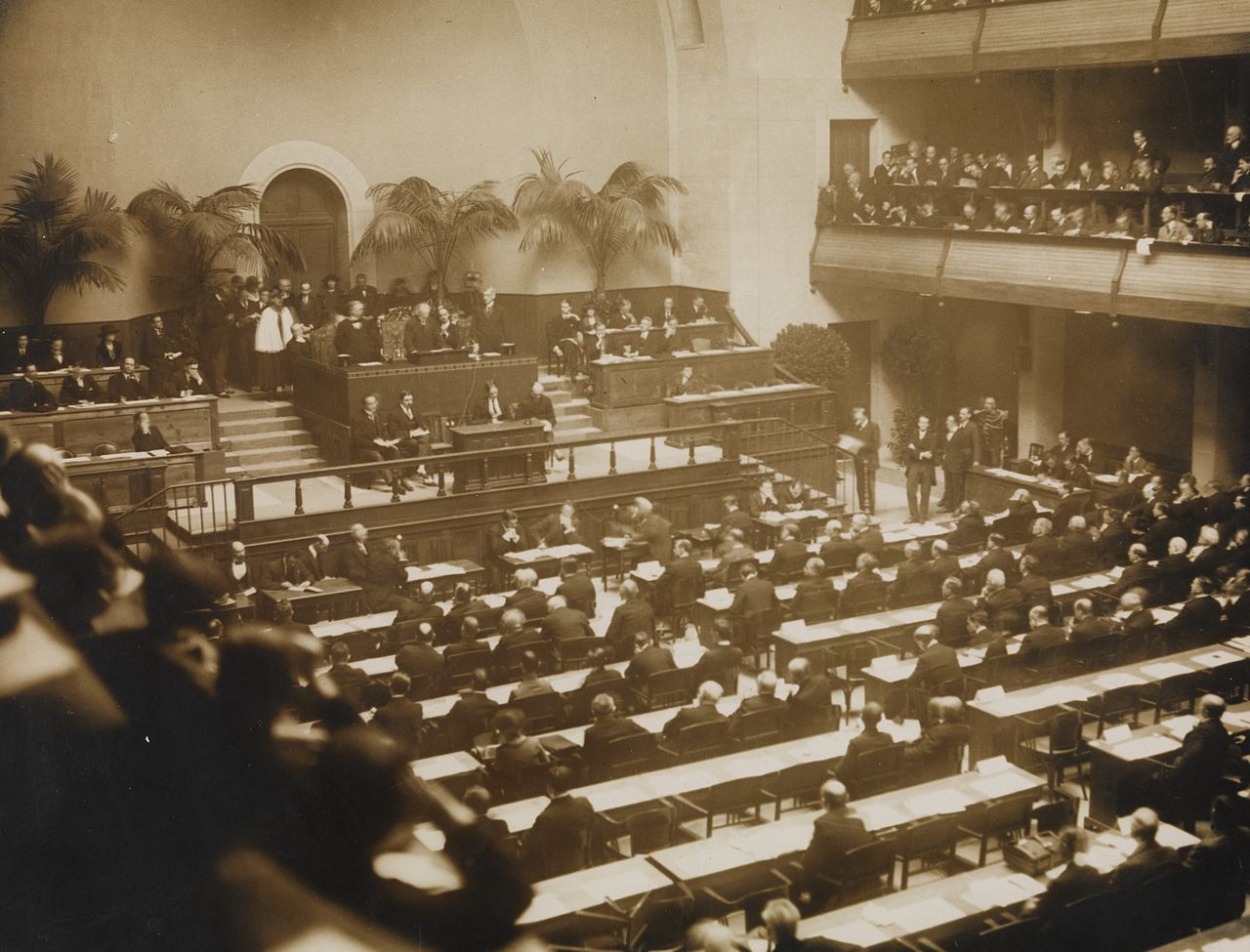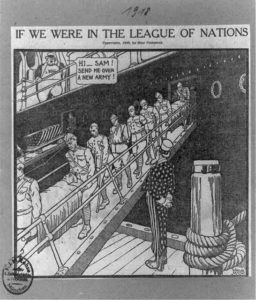League of Nations
World War I came to a peaceful end in 1918 as government leaders saw the death and destruction that remained across all the battlefields in Europe. Landscapes once beautiful, like the Ardennes Forest, became hell-scape as trees toppled by artillery cannons and held no economic usage besides as a reminder of the tragedy. To prevent future conflicts, the major Allied powers came together under Woodrow Wilson’s thought of an international organization. Based off his Fourteen Points, the last of Wilson’s points discussed the establishment of, “a general association of nations must be formed under specific covenants to afford mutual guarantees of political independence and territorial integrity to great and small states alike.”[1] With Wilson idea for the organization in mind, it seemed that he wanted the League of Nations to serve as a mediator. As what he wanted the organization to be, it would serve to prevent further wars through delegation and attempted to meet both sides. However, in 1919 the United States Congress decided against joining the League of Nations as Britain and France remained the heads of the organization. In this article, it will discuss several different points about the League of Nations as it will focus on public opinion, the problems of the league of nations, and how it brought out the Second World War. As stated previously, the United States played a major role in the creation of the League of Nations but never came part of the international organization due to the Senate and the opinions of the American people.

Detroit Publishing Co., Publisher, Harris & Ewing, photographer. Woodrow Wilson. , None. [Between 1900 and 1920] Photograph. https://www.loc.gov/item/2016800586/.
The United States and American Opinion of the League of Nations
On November 19, 1919, marked the first series of voting by the Senate on whether the United States joined the newly founded organization called the League of Nations and the Treaty of Versailles. Woodrow Wilson asked his supporters in the Senate to vote for the treaty; however, a faction led by Senator William Borah called the “irreconcilables” opposed the treaty at any cost. [2] With a Republican majority at the Senate, the treaty became rejected by the United States Senate with a 53-39 split as it fell short for the two-thirds majority needed for the treaty to become recognized. [3] Using newspapers from 1919, it became apparent that the Senate largely rejected the treaty and the League due to America’s opinion on the subject.
A multitude of events occurred in 1919 America, as the First World War came to an end nearly a year after American troops deployed to the European front, the American people became angered at Woodrow Wilson. Voted by the American on the promise to keep the United States neutral, Wilson in 1917 forced American deployment after a series of events that included German submarine attacks that killed American citizens transported on British passenger vessels. [4] Despite those events, the American public desired to remain neutral in the European conflict and later affairs. The public opinion demonstrated through a news story from the San Francisco Examine discussed the latest Senator election in 1919. The author of the article stated that the state of Oklahoma always elected the Democratic candidate with a majority, at least until 1919. With the introduction of the League of Nations issue, the Republican candidate received 11,551 votes while the Democratic candidate received 10,239 votes. [5] With that information, it became apparent that the issues that surrounded the League of Nations forced Democrat voters to stay away from the polls or made Republican voters turn out more for their party. An explanation for that situation is found in another article from the Washington Post, as the author focused on the effect of public opinion and where the public wanted the government to focus on the Domestic policy.
According to an article published by the Washington Post titled “In the President’s Hands,” the author stated the United States government should focus on the domestic problems such as, “… the railroads, the reds, the strikes, the appropriations, and other pressing business”. [6] It appeared that Americans wanted to no longer focus on the war-torn Europe and deal with other crucial problems that came out throughout their own society. Additionally, the article provided that the Senate voted the way against the decision due to the public’s negative opinion on the League of Nations. As the Senate relies on the public voters to keep them in office, the author of the Washington Post article believed that Senators sided with the public for that reason. [7] Spotting the connection between the Senate and the public, it would be important to discuss how the public felt about the League of Nations.
With the League of Nations affecting the opinions of the American citizen as seats, previously held by Democrats transferred into Republican hands. Although the public opinion on the topic of the League of Nations appeared split on a national level, it appeared that Americans that disapproved of the League feared the worst. According to an article published by the New York Times in 1919, Senators summarized the feelings of the disapproved as American citizens fearful of America abdicating its independence and surrendering its influence on the world. [8] As a young nation in 1919, people frightened to lose all the progress the United States made especially after aiding the First World War. Furthermore, the American people did not Europeans mixed into the quarrels of the United States and vice versa. The same article briefly detailed that people disapproved of the League under the belief that America should not mix with the problems of the European nation. [9] Despite no evidence points towards who wrote those opinions, it appeared that the second point matched the belief of isolationists who became prominent during the decision for America’s entry into the First World War. Later in the year, disapproval for the League continued among Senate and Public which delayed American acceptance of the Treaty of Versailles to the late 1920s that left America out of the League of the Nations. Despite the United States membership into the League never happened, historians will notice that the League of Nations had a multitude of weaknesses.
Problems with the League of Nations
Attempted to bring about an end to all wars, the League of Nations attempted to end wars without needless bloodshed. Although a justice idea, the League of Nations caused a variety of problems during its short life-span as the leaders of the organization attempted to appease Adolf Hitler which eventually led to the outbreak of the Second World War. Through the policies supported by the League, it weaken the Allies ability to defend themselves against Nazi Germany in the Second World War. These weaknesses of the League Nation all fall into the concept of collective security and disarmament.
The definition of collective security with the League of Nations emphasized that the world become part of the security to secure the rights of small and large states equally with the strength of the powerful nations. [10] With approximately fifty-five members near the start of the Second World War (1939), it meant that a large portion of the world’s population covered under the League of Nations. [11] The split system power between three different bodies called the Assembly, Council, and Secretariat, as each of the bodies to help the smaller states. However, the Secretariat represented as the “functional bureaucracy of the League,” as it had eight Council member seats. However, four of those seats remained permanent seats for the United Kingdoms, France, Italy, and Japan, the other four seats were temporary assignments and reserved for smaller states. [12] Organized by the three sections of the organization, collective security appeared haphazardly put together in terms of military aspect as each nation needed to contributed on their terms.
Under articles 11 provided any declaration or threat of war was not an individual matter but for the entire League. [13] Used as a support for disarmament policy, as neighbors became fearful of one another as nations needed to feel secure before following the plans of disarmament which led to the creation of collective security. A promise to protect one another against those that broken/deny the League’s policies was one method to begin the process of disarmament, as the League promised to go to war against those that act against a member of the League. [14] Similar to like NATO today, collective security of the 1920s were treaties and promises to go to war if someone attacked. Furthermore, the military forces did not remain controlled by the League instead by their home governments, which left the organization unable to enforce disarmament policy. Through a comparison between NATO and the treaties created by the League, it appeared that collective security became used to support disarmament policy as there is safety in numbers. Disarmament is a policy that followed back at the beginning of human history in biblical scripture is important to understand as well as how the League determined the rate of disarmament.
In the biblical scriptures, it was said by Isaiah that after the judgment of the world’s nations, the people would “… beat their swords into plowshares and their spears into pruning hooks: nation shall not take up sword against nation; they shall never again know war.”[15] Disarmament policy practiced since the early days of man and transferred into more than turning sword to plows in 1919. The League of Nations wanted the world to reduce production of armaments to certain levels that differed between each nation in the organization as no one wanted immediate disarmament. First off, immediate disarmament on a world scale is tricky and could place members in a difficult situation that left hundreds of armaments in the system. Secondly, it became commonly believed immediate disarmament could be the worst option to prevent future wars. In an article titled “Disarmament,” David Davies stated that “… immediate general disarmament would not bring about universal security, but, on the contrary, would greatly increase the chances of war.” [16] Immediate general disarmament greatly increased the chance of war as powerful nations maintained both economic and production superiority which resulted in their ability to rearm themselves faster than smaller and less powerful nations. [17] Instead, according to Davies, disarmament should advance with the public opinion of the League of Nations. [18] Although the process gradually occurred over time, it never seemed able to reach its goals during its twenty-years of operation fully.
Completely disarming all the nations of the world remained a difficult task for the League as their dream of peace never became a reality. In the early 1930s, the League organized the World Disarmament Conference in order to reach an agreement of a possible disarmament plan between February 1932 and June 1934. [19] Unfortunately, as agreements came nearly to a close in 1933, Germany departed from the organization which led to a considerable collapse to the entire committee as other members displayed disapproval of any disarmament policy after the event. [20]

Great History Teaching. Adolf Hitler Announces the Withdrawal of Germany from the League of Nations. Photograph. Pinterest. Accessed March 24, 2019. https://www.pinterest.com/pin/338966309434411007/.
By the time the League of Nations transformed into the United Nations after the Second World War, people recognized the failure of disarmament as evidence showed no substantial reductions of military forces nor regulations that prohibited the production of certain weapon types.[21] It seemed that the League of Nation failed its claims of ending the conflict through reduction as the Second World War broke out in the fall of 1939.
Collective security and disarmament were unable to deter Adolf Hitler from invading Poland as he saw the League of Nations as a weak organization. During the late-1930s, the League of Nations allowed several smaller and less powerful nations that became occupied by Nazi Germany. In an attempt to resolve conflict, the League tried to appease Adolf Hitler through those small offerings of land in Austria and Czechoslovakia as France and the United Kingdom did not react with military force. Rather appealing the aggressor than attacking them, the League allowed collective security to crumble and allowed Germany to gain more power and territory. In September of 1939, Germany invaded Poland as the League responded with military force; however, were too late to beat back Germany. As a result, the League would fall apart as France fell in late June of 1940 leaving the United Kingdom to stand against Nazi Germany alone.
Other Resources
Encyclopaedia Britannica: League of Nations
The site provided an in-depth overview of the League of Nations as it broken down into the Origins of the League, Covenant, Structure of the League of Nations, Political History (1920-45), and the members of the League of Nation. Each does offer links towards key-words to provide background to the topic.
Office of the Historian: The League of Nations, 1920
Provided a basic overview of the League of Nations and focused primarily on the America’s involvement in the creation of the League of Nations.
Citations
[1] Woodrow Wilson, “Transcript of President Woodrow Wilson’s 14 Points (1918),” Our Documents, accessed March 18, 2019, https://www.ourdocuments.gov/doc.php?flash=true&doc=62&page=transcript.
[2] Andrew Glass, “Senate Rejects League of Nations, Nov. 19, 1919,” Politico, November 19, 2014, https://www.politico.com/story/2014/11/senate-rejects-league-of-nations-nov-19-1919-113006.
[3] Ibid.
[4] The Editors of Encyclopedia Britannica, “Lusitania,” Encyclopedia Britannica (Encyclopedia Britannica, Inc., February 7, 2019), https://www.britannica.com/topic/Lusitania-British-ship. The Associated Press, “Lusitania Not Armed Is Stated,” The Eugene Guard, June 15, 1915, 1-3.
[5] “Democrats Are Not for the Wilson League of Nations,” The San Francisco Examiner, November 20, 1919, 26.
[6] In the President’s Hands,” Washington Post, November 21, 1919, https://www.newspapers.com/image/28845384/, 6.
[7] Ibid.
[8] “Find Peace League Opinion Divided: Senators Receive Messages of Approval and Disapproval in About Equal Number. Want Exhaustive Debate,” New York Times, February 18, 1919, 1.
[9] Ibid.
[10] Lynn H. Miller, “The Idea and the Reality of Collective Security,”, Global Governance: A Review of Multilateralism and International Organizations 5, no. 3 (1999): pp. 303-332, https://doi.org/10.1163/19426720-00503003, 306.
[11] Jari Eloranta, “Why Did the League of Nations Fail?,” ,Cliometrica 5, no. 1 (2010): pp. 27-52, https://doi.org/10.1007/s11698-010-0049-9, 30.
[12] Ibid.
[13] “League of Nations Covenant,”, Infobase, n.d., accessed March 23, 2019, Article 11.
[14] Jari Eloranta, “Why Did the League of Nations Fail?,” ,Cliometrica 5, no. 1 (2010): pp. 27-52, https://doi.org/10.1007/s11698-010-0049-9, 31.
[15] The Jewish Study Bible: Tanakh Translation: 2nd ed. (Oxford, NY: Oxford University Press, 2014), p. Isaiah, 2:4.
[16] David Davies, “Disarmament” 5 (1919): pp. 109-118, http://www.jstor.org/stable/742850, 109.
[17] Ibid.
[18] Ibid.
[19] Andrew Webster, “The Transnational Dream: Politicians, Diplomats and Soldiers in the League of Nations’ Pursuit of International Disarmament, 1920-1938,”, Contemporary European History 14, no. 4 (2005): pp. 493-518, 495.
[20] Ibid.
[21] Ibid.


No Comments